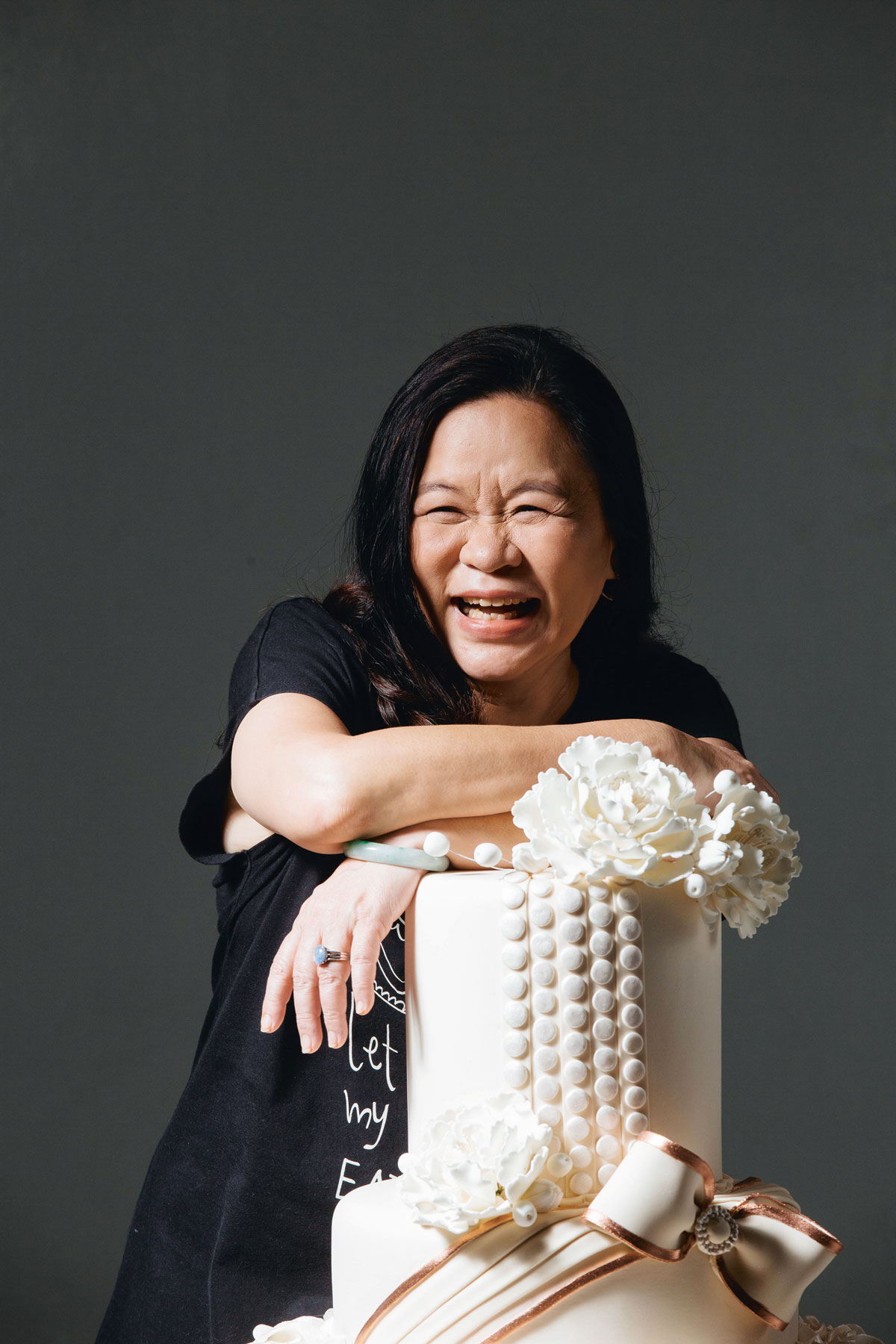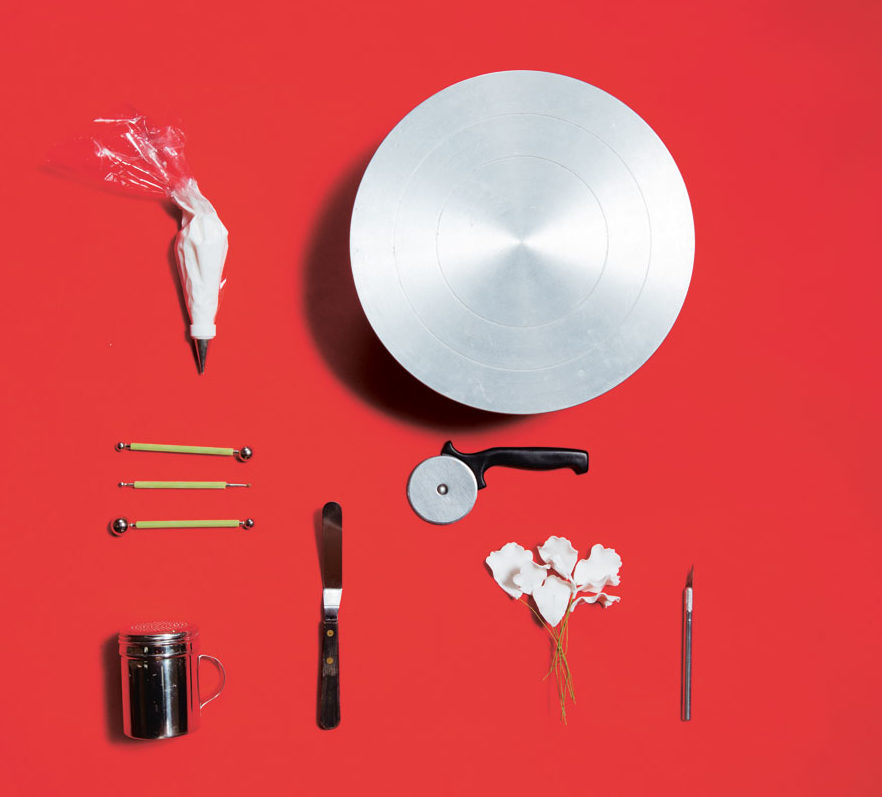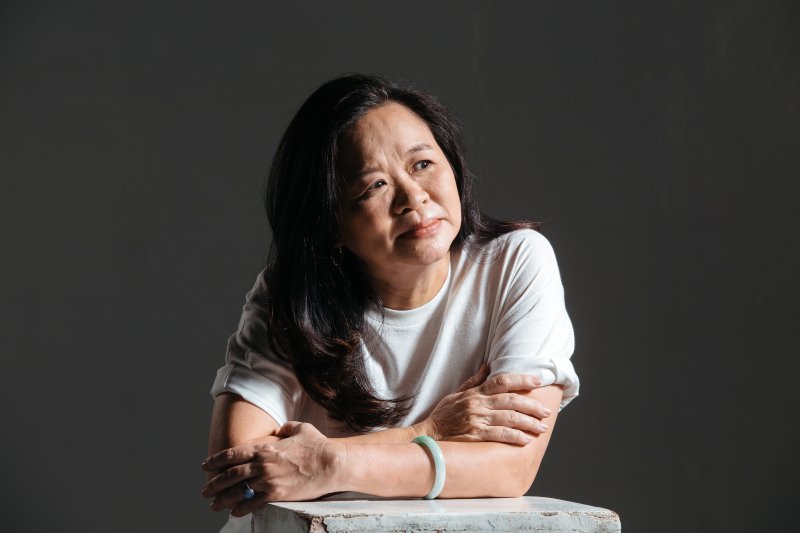Penk Ching’s contemporaries at the Pastry Alliance of the Philippines informally call her the “queen of cakes.”
“We were in Lyon, France for a competition and I came down for breakfast at the B&B. There was no chair available for me, and Jackie (Ang-Po) jokingly said, ‘The queen has arrived, let her sit!’ Three boys stood up and offered me a seat.” The name stuck and friends started calling her that. “Hindi ako iyan!” she laughingly brushes it off.
She is indeed shy about the title she has earned by working hard to perfect her craft, a task that has spanned 31 years. “It was only 10 years ago when Philippine culinary icon Glenda Barretto gifted me with a chef’s jacket that I started wearing one. ‘Here, you deserve it,’ I remember her saying.”
One main hesitation in attaching the title ‘chef’ to her name is that she had no formal culinary background. She was a banker by trade taking up a business course with two Masters degrees and PhD units under her belt. Baking was just a hobby. “My mom was not into baking. I had a tita who baked and I remember going to her house to assist her because everything smelled wonderful,” she recalls.
Wedding bliss

It was in high school that the love for ovens warmed up even more. “I would spend more time in the home economics lab than my classmates because I wanted to learn everything.” Practicality dictated that she take a business course instead of food technology studies since there were no culinary schools at the time. “What I really wanted to take up was fine arts. I love baking because I love to eat, simple as that,” she smiles.
Though she enjoyed her time at the bank, where she was one of the managers for training and recruitment, she couldn’t deny the satisfaction she had churning out pastries from her oven. “I had to hide it kasi bawal,” she chuckles. “It was an open secret though because even my bosses would order brownies and bars from me.” She took an early retirement option because the long hours that included talking to corporate partners overseas in different time zones interfered with her wish of having a baby.
“What I really wanted to take up was fine arts. I love baking because I love to eat, simple as that,” says Penk Ching.
Banking’s loss turned out to be a boon for brides. Ching decided to take up baking classes whenever she could. “I would make cakes for friends who urged me to learn how to decorate. Masarap na daw kasi pero kulang sa ganda,” she smiles. To address this, she and her sister Shen Ratilla took a class under Avelina Florendo of CCS Bakeshop.
A friend took note of her decorating skills and referred her to the mom of a bride-to-be. “They called me five months before the wedding. I didn’t take the request seriously because it was really a hobby for me.” The mom and the bride did, though, and they called again two months before the day. There was no backing out for the novice baker as they were insistent on obtaining her services.
Her first wedding cake was a simple affair: a fondant-covered, three-layered fruitcake with posts—something that she and her sister worked hard to perfect. “I think we used up a half sack of flour for our practice,” she recalls. Practice makes perfect and that was reinforced even more when she started receiving orders with more intricate designs. “It was by word of mouth; a wedding would have a mother or sister of an upcoming bride in attendance, and so on,” she shares.
Delicacies with intricacy
There were no internet resources then so she scoured books and magazines and attended local and international classes and exhibitions. Her most challenging cakes to date include the inaugural cake for President Benigno Aquino III featuring a scale replica of Malacañang Palace and a bird’s nest structure celebrating the 2008 Olympics in China. “With the Malacañang cake, it was difficult because they were so strict. The logistics of transporting the Olympics cake were difficult!”
Her studded career was marked not just by awe-inspiring creations but a number of nightmares and near-misses as well. “I had a wedding in Hong Kong where my mistake was accompanying the cake alone. I was already waiting for it to be released from the cargo when I saw the boxes exit the cargo hold, do somersaults, and land with a heart-dropping thud.” When she finally gathered the courage to peek at her boxes, she saw the bad shape her confections were in. Luckily, she had a few pounds of fondant on her, and with some major patchwork, was able to remedy the damage.
Another time, the cakes made it safely to the venue but the gum paste lanterns suffered from the humidity and had to be dried. Ching took over the hotel’s kitchen spaces and started air-drying the lanterns. When she started the assembly, she heard a distinct crunch. “There was this huge guy, a florist who did not see the pans on the floor and stepped on the lanterns. He just muttered sorry and went on his way.” Ching salvaged what she could, and again, saved the day.
“The brides would say they want the best and pepper their descriptions with adjectives that start with ‘the most,’ but they balk kapag budget na ang pinag-uusapan. Sana naging magician na lang ako,” says Penk Ching.
She looks back on these mishaps now with humor, saying they were learning experiences. And learn a lesson she did. Now, her cakes come packed in clear boxes labeled “cake” in big, bold letters. Bigger pieces are transported in wooden crates with a letter to the airline to ensure that her parcels are handled properly.
“I look at every cake as a challenge,” she quips. Wedding cakes are particularly challenging. “The brides would say they want the best and pepper their descriptions with adjectives that start with ‘the most,’ but they balk kapag budget na ang pinag-uusapan,” she grins, and adds, “Sana naging magician na lang ako.”
Her advice to brides is to choose a cake with coherence. “I tell them that we don’t want her to have something that resembles a Christmas tree. There should be a focal point, there should be flow.” Trends come and go, so she advises sticking to the classics. When she started out, everyone had cakes that had stairs and pillars. Several trends have emerged since then.
The dynamism in the industry is something that Penk Ching is excited about. The country is becoming known for its talented pastry chefs.
“A couple of years ago, people wanted ‘naked’ cakes, those that don’t have icing. Then they realized that this doesn’t work. Dust and insects settle on it, and when time comes to eat it, the cake has already become hard and dry.” Cupcakes used to be a thing, too, but Ching says they make a formal wedding look like a kiddie party. “A lot of brides want it thematic, to go with their color scheme, etc. I tell them it is best to stick with a classic design, so that even years from now, the photo will still look good and you won’t regret going with something too faddish.”
Even if she’s a stickler for the classics, she still tries to push boundaries. Her latest project involved a cake with a painting done in fondant used as a base layer. “It took me seven hours to finish, and unlike a regular painting which stands on an easel and where I have support for my arm, ito wala.” This was topped by a layer of lights encased in cones and another layer with sculpted fruits.
Delectable dreams

The dynamism in the industry is something that she is very excited about. The country is becoming known for its talented pastry chefs. “As chief operating officer of the Pastry Alliance, I think we are getting there. I am leaving for Davao with a group to share our knowledge there. We try to tell them what the latest things are. They might not want to do these, but at least they are aware of what is out there.”
They have been joining competitions internationally and she says with a measure of pride that they have been leveling up each time. “In the competition held in France (Coupe de Monde de la Patisserie held in Lyon in January 2015), we were ranked 12th among 21 countries, which is good. We are not yet at par with countries such as the U.S., Italy, Japan, Malaysia, or Singapore, but we are getting there with our gold and silver medals. Sa Pastry Alliance, maingay kami. We are announcing to the whole world that we are here.” She shares that the group is self-funded, and they raise funds for their competition travels from their teaching sessions.
She is also a judge for the World Association of Chef Societies, which allows her access to the latest industry trends and techniques. She brings these ideas back home, applies them to her own creations, and shares her knowledge with her students.
Her advice for home bakers and aspiring pastry chefs is to take their time. “Don’t rush things and despite the allure of fame brought about by these TV shows and social media exposure, don’t make that your sole motivation.”
“’Yung mga santol, guava, and other local ingredients na nabubulok lang sa market, I think we should utilize these more,” says Penk Ching.
What she would really like to see, she confides, is the use of more local ingredients in the dessert scene. Despite the availability of imported fresh fruits, preserves, and canned products, she would like to see more native fruits make their way into our confections. “’Yung mga santol, guava, and other local ingredients na nabubulok lang sa market, I think we should utilize these more. It has already started and I would like to see this happening more often.”
When it comes to the local pastry scene, there’s one name people can always rely on for producing majestic confectionery creations and making the seemingly impossible possible. Ching may not be a magician, but she manages to make fervent cake wishes come true. And for that alone, she deserves to sit on the throne and forego the title of queen for one that’s more fitting—the doyenne of desserts.
Originally published in F&B Report Vol. 13 No. 3






If you have talent and flourish it up with determination you sure would can achieved what she have achieved. Everyone deserve for their right to shine and follow their passion and make something out of it.